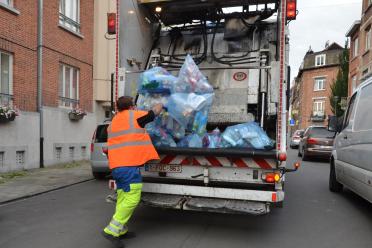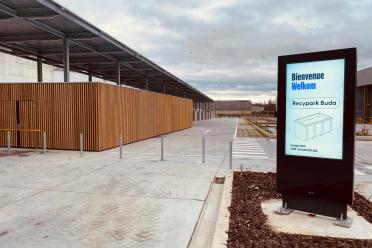
Containers
What initiatives are underway to improve waste management?
Bruxelles-Propreté is carrying out a study on the performance of voluntary drop-off collection, in particular via sorting centres. The main objective of this study is to examine the performance of the voluntary collection of household waste (in particular via sorting centres) in urban contexts comparable to the Brussels Region. The aim is to assess the possibilities for optimising the performance of the sorting facilities already installed in the Region and to analyse the benefits of (and conditions for) introducing this type of infrastructure in other types of neighbourhoods or residential areas in Brussels.
What are the advantages of door-to-door collection over containers?
Door-to-door collection ensures maximum proximity without the need to travel for people with reduced mobility, the elderly and working people. It's a tried and tested service that is organised in the same way in many other European cities. Many Brussels residents are keen to use it. We have also noticed that some of the collection points tend to become rubbish dumps.
What about new homes?
For new buildings, sorting areas with underground containers have been developed in partnership with property developers or social housing managers. As a result, about ten neighbourhoods are equipped with sorting areas and about twenty projects will be equipped over the next few years. The purchase of underground containers is the responsibility of the applicant (e.g. property developer), not the Agency.
Why not generalize the use of voluntary drop-off points, wheeled containers, or underground containers?
This type of wheeled system takes up a significant portion of public space and presents several risks: obstacles for pedestrians and people with reduced mobility (PRM), parking issues, and increased risk of accidents in case of bad weather and/or vandalism. Our experience shows that these containers are easily moved, overturned, or set on fire. For these reasons, we believe they are not an optimal solution for improving waste collection.
Voluntary drop-off points and underground containers may seem convenient, but their implementation raises several challenges:
- Cost: While collection is often cheaper, installation is much more expensive.
- Space: Suitable locations must be found, which can impact parking and neighborhood life. Moreover, Brussels’ underground infrastructure is complex (numerous pipelines), limiting the installation of underground containers.
- Illegal dumping: These installations often lead to an increase in illegal waste deposits around the containers.
Sorting quality: It may be lower compared to other systems.
Bruxelles-Propreté has already conducted an initial study and is currently finalizing a detailed cost analysis.
We are working on a neighborhood-based approach, as a one-size-fits-all solution for the entire Region is not realistic. Each neighborhood has its own specificities—for example, an area with houses and gardens has different needs than a street lined with apartment buildings.
Note: 24% of Brussels households already use wheeled sorting containers, mainly in large apartment buildings. Underground containers have also been tested to assess their effectiveness in terms of collection, sorting, and cleanliness.
Why doesn't Bruxelles-Propreté use containers instead of bags?
We collect waste using three main methods: bags, mechanized containers, and sorting areas (underground containers).
Bags are primarily intended for houses and small apartment buildings. Mechanized containers are mainly used by large businesses with sufficient storage space and by large apartment buildings. Finally, sorting areas or underground containers are dedicated to new or very recent collective housing buildings with more than 150 housing units.
Generalizing container-based collection to all Brussels households is not feasible for several reasons:
- Many households live in apartments and do not have enough space or a dedicated room to store multiple containers for each waste fraction.
- The installation of wheeled containers on public roads has already been tested and evaluated. Unfortunately, the results were not conclusive. We observed numerous inconveniences (encouragement of illegal dumping, non-compliance with sorting rules, obstacles or dangers for traffic and pedestrians, etc.).
Lastly, underground containers are a solution adopted in the Brussels Region for new neighborhoods. Several projects have already implemented them. However, generalizing this collection method is not currently planned for various reasons:
- Sorting quality from underground containers still needs improvement (previous studies by Fost on underground systems used by various intermunicipal authorities show lower sorting quality compared to door-to-door collection).
- Public cleanliness issues remain unresolved (illegal dumping is frequently observed around underground containers).
- It is not always possible or desirable to install underground containers due to space constraints or the need to preserve Brussels’ underground infrastructure and public space.


